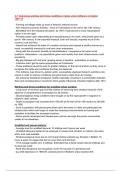3.7: Improving working and living conditions: trades union militancy in Ireland
1907-14
- Farming and tillage made up most of Ireland’s national income
- Also enjoyed economic diversity - much of it developed in the mid to late 19th century
- Benefitted from the industrial revolution, by 1907 it had become a more industrialised
nation in its own right
- Primarily based upon shipbuilding and manufacturing in the north, while Dublin grew as a
port in 18th century, it now exported livestock, beer and biscuits, imported much of the
country’s coal and flour
- Ireland had achieved the basis of a modern economy and enjoyed a healthy income as a
result, successfully marrying its rural and urban enterprises
- Along with the economic benefits of industrialisation, it experience the same social
problems: urbanisation - city populations grow more quickly than their infrastructures could
provide for
- Big gap between rich and poor, growing sense of injustice - exploitation on workers
- Catholics didn’t get the same opportunities as Protestants
- These problems paved the way for greater militancy on the part of workers as they came to
recognise the rights and conditions that they too deserved
- This militancy was driven by James Larkin, successfully organised Ireland’s workforce into
unions in order to improve conditions and grant them a clear forum for change
- His presence threatened employers, Dublin especially, resulting in a confrontation between
them and emerging labour movement which greatly influenced industrial relations after 1913
Working and living conditions for unskilled urban workers:
- Long hours of minimum pay and little chance of improving their situation because of the
absence of comprehensive unionisation for all workers
- Disadvantageous living conditions were brought on by the rapid growth in migration to
Ireland’s urban centres
- Dublin’s population had increased from 180,000 at the start of the 19th century to 290,000
by 1900
- Such a population shift placed great strain upon the towns in Ulster and particularly the
infrastructure which took longer to make the necessary improvements to housing and
sanitation to facilitate the increased numbers
- Slums quickly developed and disease was common amongst the poorer communities
unable to live elsewhere
Unskilled and casual workers:
- Average level for unskilled labourer 10 shillings and 9 pence per week
- Unskilled labourers tended to be employed in casual work (dockers or carters) only taken
when work was available
- Worked excessive hours due to not having binding contracts eg. Dockers in Belfast, 75
hours a week, for wages that did not cover their rent and food
- 1914 average weekly rent: 4 shillings. Estimated that a family would need 22 shillings and
5 pence per week
- Work also dangerous and unsanitary, never the security of a permanent job
- eg. brief depression in 1908-09, unemployment in Belfast’s ships reached 20%
, - Unskilled casual worker lived a life of uncertain subsistence without good wages or any
definitive legal protection
- Shortfall in income often had to be made up by wife and children working also
- Women often domestic servants or in linen mills
- Children could work from 12
- Such was the need for money that many forged their age
- Children would be unfit for the laborious tasks and long house
- Poor diet, tea, potato bread and oats - left them undernourished. Reduced life expectancy
- 1900-02: 49.3 years for males and 49.6 for females
- Mortality rate was also higher amongst infants and children. In Belfast: 153 per 1,000 births
and Dublin: 169 per 1,000 in 1900
Unskilled urban workers:
- Dublin had 2 major businesses: Guinness brewery and Jacob’s biscuits
- Being a significant port, it had attracted a lot of people to the city but could not afford to
improve the facilities quickly enough to accommodate its new residents
- Slum areas developed, Georgian buildings became homes for multiple families
- 25,822 families were living in 5,322 tenements, of this number more than 20,000 families
each lived in only one room together
- Slums dangerous, collapse of one killed 7 people which led to a survey on the housing
situation
- A study examining 1,254 of local families concluded that half of the city’s population lived in
poverty and could not meet basic requirements for general good health
- Malnourishment was a constant problem as diets consisted primarily of bread and tea with
occasional vegetables
- Didn’t have staple carbohydrates to fill the body, lacked necessary additional vitamins and
minerals
- Unskilled labouring poor, living conditions were abject and this was reflected in the mortality
rates - much above Britains
- Main cause of death usually pulmonary tuberculosis which was propagated by a weakened
immune system that couldn’t fight it off
- Tuberculosis, like cholera and typhus, was a disease that thrived in poor living
environments
- These conditions in part due to the inability of this section of the population to take effective
action to improve their positions
- Living conditions were a direct consequence of the poor wages - for the majority a single
room was all they could afford
- Without the opportunity of a wage increase or permanent employment, there was little
chance of a better lifestyle
- After 1907, unskilled workers were given the chance to help themselves with the
organisation of Irish dockers into the National Union of Dock Labourers
The National Union of Dock Labourers and the Belfast strike 1907:
- NUDL - founded in Glasgow 1889 then relocated to Liverpool
- It was a vehicle for achieving better conditions for the less skilled workers on the docks
- Began to recruit in Belfast





